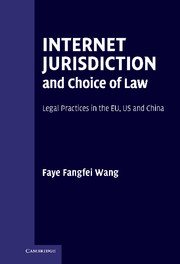Book contents
- Frontmatter
- Contents
- Preface
- List of Abbreviations
- Table of Cases
- PART I Introduction
- PART II Jurisdiction
- PART III Choice of law
- 6 Choice of law in electronic contracting
- 7 EU Internet choice of law regime
- 8 US Internet choice of law rules
- 9 Chinese Internet choice of law approaches
- PART IV Online dispute resolution
- PART V The future
- Appendix 1 Council Regulation (EC) No 44/2001 of 22 December 2000 on jurisdiction and the recognition and enforcement of judgments in civil and commercial matters (Brussels I)
- Appendix 2 Regulation (EC) No 593/2008 of the European Parliament and of the Council of 17 June 2008 on the law applicable to contractual obligations (Rome I)
- Bibliography
- Index
9 - Chinese Internet choice of law approaches
from PART III - Choice of law
Published online by Cambridge University Press: 03 May 2011
- Frontmatter
- Contents
- Preface
- List of Abbreviations
- Table of Cases
- PART I Introduction
- PART II Jurisdiction
- PART III Choice of law
- 6 Choice of law in electronic contracting
- 7 EU Internet choice of law regime
- 8 US Internet choice of law rules
- 9 Chinese Internet choice of law approaches
- PART IV Online dispute resolution
- PART V The future
- Appendix 1 Council Regulation (EC) No 44/2001 of 22 December 2000 on jurisdiction and the recognition and enforcement of judgments in civil and commercial matters (Brussels I)
- Appendix 2 Regulation (EC) No 593/2008 of the European Parliament and of the Council of 17 June 2008 on the law applicable to contractual obligations (Rome I)
- Bibliography
- Index
Summary
In China, the two general principles to determine applicable law in contracts are the same as those in the EU and US: the first is party autonomy, where parties are free to choose the applicable law governing the contract; second, the closest connection or the most significant relationship to the contract or transaction is regarded as a linking factor to determine the applicable law in the absence of choice by parties. However, China is a civil law country with written laws. There can be no choice of law element in a contract in China unless the contract includes an “international” factor. A contract is deemed to be “international” when (1) at least one party is not a Chinese citizen or legal person, (2) the subject matter of the contract is in a third country (i.e. the goods to be sold or purchased are located outside of China), or (3) the conclusion or performance of the contract is made in a third country.
Foreign-related cases have been dramatically increasing. In 2004, there were about 17,066 new foreign-related cases, an increase of about 8%.
Party autonomy/freedom of choice
In China, party autonomy is a paramount principle in determining the applicable law for contracts. The National People's Congress of the People's Republic of China enacted a unified Contract Law, which has been in force since 1 October 1999. It also deals with the applicable law in foreign contracts. Article 126 of the Chinese Contract Law provides a party autonomy rule that:
Parties to a foreign related contract may select the applicable law for resolution of a contractual dispute, except as otherwise provided by law.
- Type
- Chapter
- Information
- Internet Jurisdiction and Choice of LawLegal Practices in the EU, US and China, pp. 133 - 140Publisher: Cambridge University PressPrint publication year: 2010



